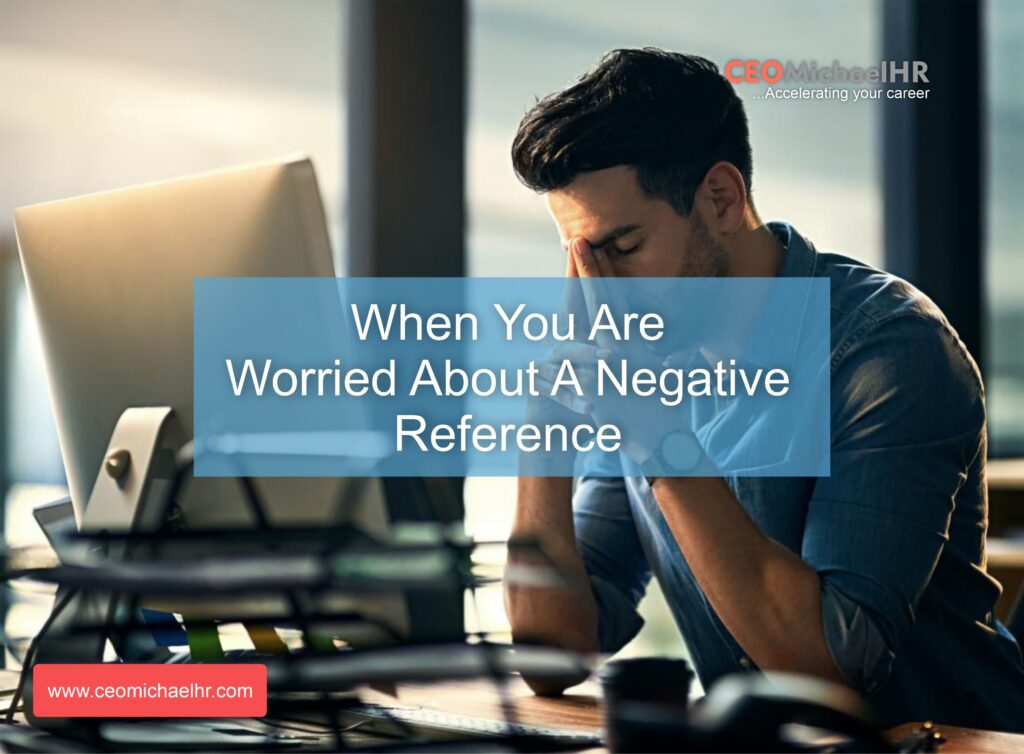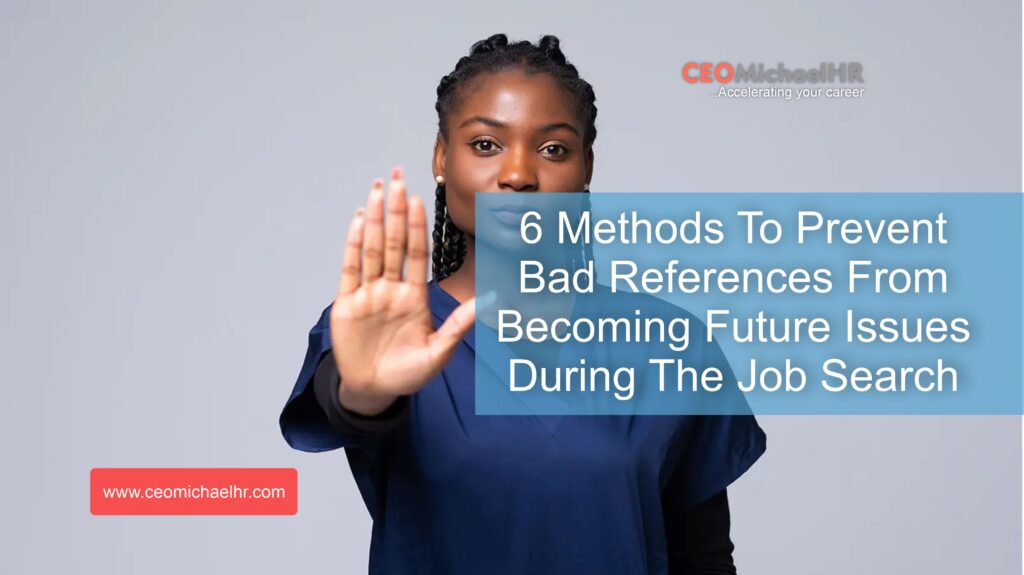
New clients, unlock 10% off all plans 🔥 at checkout with code: CEO10SPECIAL (Limited Time Offer)
New clients, unlock 10% off all plans 🔥 at checkout with code: CEO10SPECIAL (Limited Time Offer)






Do you know to a very large extent negative references can deter your hard work overnight?
Do you feel concerned about getting a bad reference from one of your old employers?
Worry less, because this can happen even to the most proficient workers. We’ve all been there!
Certain jobs simply do not work out because they may not be a good fit or we’ve made some irreversible mistakes in the past.
In this article, we’ll share key steps on what you can do if a previous employer gives a bad reference that is capable of ruining your career.
When you’re seeking for a new job opportunity, you’ll usually need a reference from your previous employer. The reference your old employer gives you could be as short as they like since a lot of references only highlights what your job title was and the time you worked the position.
Have you been given a bad reference? See it as one of those bad lucks, pick up the pieces, and press forward.
There are many times perception of your performance will differ from that of your boss, or you’ll find yourself in an environment that for one reason or another do not allow you to shine out your full potential.
Note that in any of these situations, it is crucial to minimize the chances of receiving a negative reference that will follow you to your next job.
One negative or even lukewarm reference can drastically reduce your chances of landing a position.
However, with a little preparation, you can avoid getting a bad reference—or manage the damage when it becomes an unavoidable situation.
Here, we’ve curated three (3) steps you can take to handle that worrisome feeling about a negative reference from your previous employer.
You might like: What to do When Your Boss Doesn’t Like You

Unfortunately, taking steps to screen bad references wouldn’t be enough to protect your reputation with your potential recruiter.
This is because a number of (HR) departments always ask to speak to former recruiters, whether or not they’re formally listed as a reference.
So, below are list of things you can do when you feel worried about a negative reference from a previous employer.
You can act proactive once you feel certain that the manager will still be contacted despite not being on your reference list.
Your best bet in this circumstance is to reach out to the former manager, and explain the situation—that you know you didn’t part on the best terms, and would not normally put the person down as a reference, but that you believe the hiring company will be in touch anyway.
A lot of individuals will be willing to let go of the past, and you may be able to negotiate to a reference that you both feel comfortable with.
You might discover in many cases that you have a better relationship with your previous manager’s boss and can choose to enlist their support.
There also can be situations where you can tap a combination of colleagues at your level, staff and clients who reported to you in order to fill out your roster of references.
Still worried that a previous manager might provide a negative reference if contacted by an employer?
You have the best strategy to provide as many other positive recommendations as possible to overrule the impact, or perhaps make it unnecessary for employers to seek input from your previous manager.

You already know the law doesn’t prevent negative references which can make past supervisors give them or speak poorly of you if they want to.
Before listing your past company, ensure to check with them to see what they will say in their recommendation.
While other companies may simply not comment, others will tell you upfront if they think it inappropriate to send referrals their way.
You can consult with a colleague to call and see what the reference would be before including it on your professional reference list.
Once the review is negative or unconfirmed, we recommend you avoid listing the company on your reference list.
You might like: 10 Powerful Changes for Your Executive-Level Resume
Okay, you’re on a page where a negative reference is unpreventable and your former boss has already hurt your reputation, we recommend reaching out to negotiate a truce.
Be courageous and call your former boss if they would be willing to agree to a future reference call.
This call might dread you, but always remember saying no would be the worst that can happen.
So, you decide to take this route? Ensure you’re careful not to come off judgmental.
Enter the conversation with compassion and understanding, listening to their complaints, offering solutions to the problem, and very ready to apologize.
Don’t forget to always listen to their side of the story and avoid accusation statements like “You”.
Ensure to politely explain the negative impact of the review on your career and never argue during your conversation.
As you proceed with the conversation, if you notice it doesn’t look like it is going to accomplish anything positive, try to be assertive and elaborate upon why you think it is unprofessional and counterproductive to both sides.
Many employers will feel pity for your mistake, especially if you are young and just starting out, or they may fear legal recourse.
Note that giving a bad reference to former employees based on false information is unethical.
Many at times the bad item on your professional reference list is a case of a misunderstanding or some form of misleading information.
If you notice a factually inaccurate reference, you may go the extreme by skipping your former boss and going straight to the Human Resources (HR) department.
Explain that the supervisor had wrong information without being judgmental or making it look like they are lying.
Due to HR specialists having extensive training in handling this type of problem, they will adequately investigate your claims.
In most cases, if you can prove the information is wrong, they will apologize and make it right with the potential employer.
You might like: How to say you were fired on an application
When all effort to negotiate your bad reference proves abortive, explain it to potential employers.
Say it upfront to the potential new recruiter that the reference will not be great and take time to explain why.
Show some sense of maturity by taking responsibility for your actions as your future boss will be willing to know how you plan to prevent the same mistake from happening again.
Never give excuses or accuse your previous boss.
This strategy is particularly effective if the information is not accurate and could hurt your reputation unwillingly.
For negative references that don’t cross legal boundaries, tell them to stop giving damaging references to prospective employers by furnishing an authoritative cease and desist letter addressed to the CEO or another person high up in the organization.
This strategy proves more effective than arguing.
List the name, complaint, and negative reference material in the letter. Tell them what they are doing, why it hurts your job prospects, and to stop sending negative references.
While at this, you can include an ultimatum, like a Better Business Bureau or Chamber of Commerce complaint, if they do not discontinue their actions.
Legal remedies can be considered as last resort since it costs time and money for the both parties.
If you however cannot convince your previous employer to stop, legal action may be required.
Before seeking a lawyer, consider these; Is this the only solution? Is the negative reference causing irreversible damage to your career?
While court appearances may not be needed sometimes; a lawyer can contact the former employer on your behalf.
Many companies prefer to prevent court actions and will simply stop sending references of any sort.
It can be really difficult to build a positive image, and negative references on your professional reference list can put your professional reputation at stake.
It’ll be wise and beneficial if you’re careful of every word you say and action performed at work.
Don’t take the chance if you don’t know the outcome.
Is your resume helping you stand out for all the right reasons? Our expert resume writers can help!

Share
Further Reading
*The names and logos of the companies referred to in this page are all trademarks of their respective holders. Unless specifically stated otherwise, such references are not intended to imply any affiliation or association with CEOMichaelHR.
Land interviews 3x faster while submitting fewer resumes
Copyright © 2025, ceomichaelhr.com.
All rights reserved.
Land interviews 3x faster while submitting fewer resumes
Copyright © 2025, ceomichaelhr.com.
All rights reserved.

Learn the same techniques our expert resume writers have used to get thousands of clients closer to their next job
Unlock expert resume tips, start landing multiple interviews!

Stay connected to receive powerful career insights, updates, and inspiration that’ll help you hit your career goals.